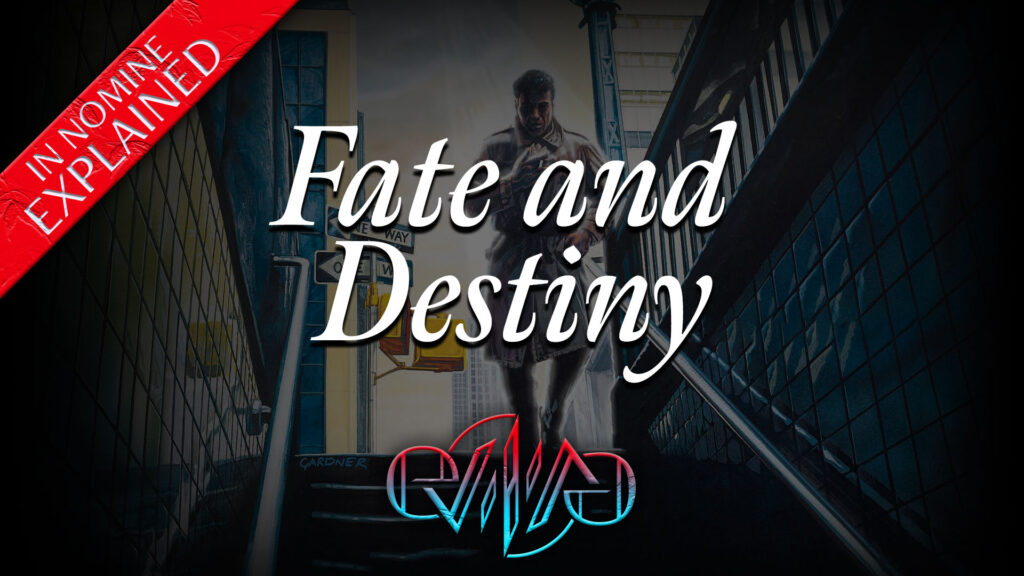Let’s take a closer look at the concepts of predestination through Fate and Destiny in the tabletop role-playing game In Nomine. In Nomine is a role-playing game designed by Derek Pearcy and published in 1997 by Steve Jackson Games. You can learn more on the official website here: http://www.sjgames.com/innomine/ or the Wikipedia page here: https://en.wikipedia.org/wiki/In_Nomine_(role-playing_game). You can buy In Nomine products here: https://www.drivethrurpg.com/browse/pub/12199/Steve-Jackson-Games/subcategory/28908_30775/In-Nomine?affiliate_id=50797
Time Stamps:
About In Nomine
Written by Derek Pearcy + Illustrated by Dan Smith
Edited by Jeff Koke, Steve Jackson, and Susan Pinsonneault
Cover art by John Zeleznik (first printing) and Christopher Shy (second printing)
In Nomine is a modern roleplaying game in which the players take the part of celestial beings – angels and demons – as they struggle for control of humanity and themselves. The celestials, powerful though they may be, are merely pawns in a much larger game being played by their Superiors, the Archangels and Demon Princes. Based on the best-selling French RPG by the wonderfully diabolical Croc!
In Nomine won the Origins Award for Best Graphic Presentation of a Roleplaying Game, Adventure, or Supplement of 1997.
Transcript
Cold Open
Every mortal has both a fate and a destiny.
Intro
Welcome to Eviliv3, the live media commentary show that answers the question, do humans have free will? Subscribe if you’re new to the channel, because today we are continuing our In Nomine series with this episode, Fate and Destiny.
Discussion
It’s always a difficult concept to wrap our mortal minds around, predestination. Seeing as this table-top roleplaying game is based on the war between angels and demons on earth, it’s no wonder that the game concepts lean a little Abrahamic in their explanations. This is not meant to be instructional as it’s just a game rather than a religious platform. You are free to ignore, alter or expand upon the concepts per your particular tastes.
But concepts like Predestination are distinctly Abrahamic as are angels and demons, so let’s continue down that path for just a moment to help shine some light on Fate and Destiny through Predestination. Oxford Languages defines it as: the divine foreordaining of all that will happen, especially with regard to the salvation of some and not others. It has been particularly associated with the teachings of St. Augustine of Hippo and of Calvin. In the game of In Nomine this concept is alive and well, as some Angelic Choirs and Demonic Bands hold resonance in guiding Humans to their fate or destiny, or altering them from it! Angels try to lead humans to their destinies because that’s what they’re here for. Demons try to lead humans to their fates because more damned souls means more Essence for Hell, less for Heaven, and more validation that Lucifer was right.
So it should be no surprise that every mortal would have a fate and destiny. And while some definitions intermix the two, they are quite separate in In Nomine. In canonical In Nomine, a human’s destiny and fate determine whether he achieves Heaven or Hell when he dies. Let’s dive in and see how one’s fate and destiny are personified so as to be aided or hindered by celestial characters.
Destiny
What is Destiny? Oxford Languages defines it as: the events that will necessarily happen to a particular person or thing in the future. In game terms, a person’s destiny is the brightest goal they can hope to accomplish. This not only makes the mortal shine, it actually affects the Symphony on a scale few angels will ever attain! Now, it is a very rare moment when a human rises to the challenge of a great destiny, but what they do, the forces of good rejoice! Some destinies are great and glorious – to overthrow a dictatorship, discover the cure for a disease that afflicts millions, even to save the world. Some are humble and seemingly insignificant in the greater scheme of things – to give comfort to a prisoner, to teach someone how to dance, or to die with dignity.
The Archangel Yves and some of his servants can actually see human destinies. They are aware of the finest things hidden in every soul, and may foretell the best that can happen and how to bring that destiny about.
Fate
So if a mortal’s destiny is the height they can achieve, what is Fate? Oxford Languages defines it as: the development of events beyond a person’s control, regarded as determined by a supernatural power. In game terms, it’s the opposite of destiny. Fate is the dark moments when, through error or selfishness, a person dooms himself to aid the Diabolical. Just as destiny is the best you can be, for yourself and the world, your fate is the worst you can be! Fates, likewise, range from the terrible to the banal, from causing a genocide to making a baby cry. This inevitably means some unfortunate souls have a fate much greater than their destiny.
A real world example of this provided by the core rules is Hitler. His destiny was to be an honest interior decorator who painted for pleasure and taught in his old age. His fate was greater and drew him to destruction. Kronos, the Demon Prince of Fate, and his Servitors can see the dark futures of mortals and work to guide mankind into the snares of their own fates, away from their destinies.
Human Choice
This is not to say mortals have nothing to say about their Fates or Destinies, as they have free will and are able to choose where they direct their energy and attention in life. Celestials naturally see this as part and parcel in the War, and use their Will and Perception to guide mortals down one road or another. However, not all mortals die fulfilling or even achieving the totality of their destiny or fate.
It is possible for a mortal to achieve both their destiny and succumb to their fate. Another real world example provided by the core rules presents the author Hemingway. He was destined to touch millions as one of the most influential writers of his century–and fated to drunkenness, despair and suicide. Whether he or Hitler reached their fates on their own is up for celestial debate. Servitors of Destiny believe that the pattern of selfishness and selflessness in an individual’s life predicts the result when the moment of decision arrives. Accepting your destiny or succumbing to your fate isn’t one random choice among many you make during your life – it’s an outcome you fashion for yourself by the way you live your life. Demons claim it’s as arbitrary as all of Heaven’s rules, but they’re perfectly willing to manipulate those rules for their own ends.
Achieving your destiny or falling to your fate are very real concepts in the game and can be used as campaign concepts to provide direction for the players. A person who reaches his destiny without sealing his fate will certainly see heaven. Someone who finds their dark fate, and not his destiny, can expect to end up in Hell. Some angels of Destiny work extra-hard to
bring a damned soul to his destiny, so that he gets a chance to reincarnate and try again, rather than going to Hell. And some demons of Fate are dedicated to bringing those who’ve met their destinies to their fate as well, in order to deny them to Heaven. Those souls who do both, or manage neither, will probably be reincarnated to try again, or their forces will be disbanded and their souls lost in the Symphony.
Celestials & Interference
Celestials have a destiny and a fate too, but not individual, detailed ones that can be discovered. An angel’s fate is to Fall; a demon’s destiny is to redeem. Most believe that angels, by being native to Heaven, have by definition already fulfilled their destiny. Some, particularly proponents of the free will theory, believe that even angels may have individual notes to add to the Symphony. Likewise, demons may have already succumbed to their fates, by virtue of being in Hell, but some believe that a dedicated Diabolical can fulfill an even darker fate.
The act of fulfilling one’s destiny or fate must be freely chosen. A Shedite can’t send a host to his fate by fulfilling it for him while possessing him. An angel can’t bring a person to his destiny by forcing him to do something… for that matter, neither can anyone else. An act that achieves a person’s destiny must be fundamentally selfless; an act that seals his fate must be selfish. So if you fulfill your destiny to bring a murderer to justice only because someone held a gun to your head as you called the police, or fulfill your fate to kill a loved one by opening a door and accidentally knocking someone off a ladder, you haven’t really met your destiny or fate. Angels of Destiny and demons of Fate can thus be blunt, intrusive meddlers, or they can be forced to act surreptitiously, without the slightest hint of Symphonic disturbance.
I hope this clarifies the concept of Predestination and the in game understanding of Fate and Destiny. If you have any other questions, feel free to leave a comment below!
Outro
Thank you for watching today’s In Nomine episode. Subscribe and ring the bell if you are new to the channel. Don’t forget to click the like button and comment to let others learn about this award winning role-playing game and this channel.
And as always, remember that evil spelled backwards is live, so get out there and Be Evil!

